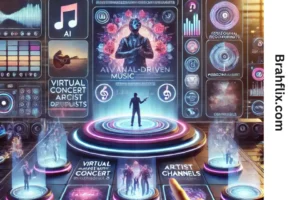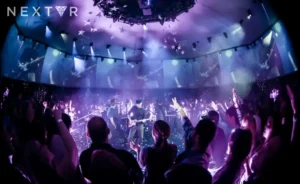Introduction
In the year 20784, the music entertainment industry is set to undergo a massive transformation, driven by advancements in technology, evolving consumer preferences, and innovative trends. From AI-driven performances to immersive virtual reality concerts, the landscape of music is becoming more interactive and personalized than ever before. This article delves into the latest innovations and trends shaping music entertainment 20784, offering a glimpse of what the future holds for both creators and fans.
Key Takeaways:
- AI and virtual reality (VR) will dominate the music industry.
- Personalized experiences will cater to individual listener preferences.
- Streaming platforms and blockchain technology will redefine how music is monetized.
- Artists will interact with fans through holographic concerts and immersive platforms.
The Rise of AI in Music Production and Performance
In 20784, artificial intelligence (AI) plays a significant role in the music industry. From songwriting to live performances, AI has become an essential tool for artists and producers alike. AI-generated music is not only a reality but a thriving part of the entertainment landscape. With the help of AI, artists can create songs faster and more efficiently, allowing them to focus on creative exploration.
- AI-powered tools like music composition software analyze current trends to create songs that resonate with audiences.
- Live performances are enhanced by AI, with virtual avatars performing alongside human artists, creating a multi-dimensional experience.
AI’s ability to understand and predict listener preferences has also improved personalized playlists and recommendations, ensuring each user receives music tailored specifically for them. As AI continues to evolve, its influence on the music industry will only grow, offering unprecedented creative opportunities.
Immersive Virtual Reality Concerts
Virtual reality (VR) has transformed the way fans experience live music. In 20784, VR concerts offer immersive experiences that allow fans to virtually attend events from the comfort of their homes. With the use of VR headsets, listeners can step into virtual venues, interact with other fans, and even engage with the performers through real-time holographic avatars.
- Major music festivals now offer VR access, where users can switch between stages, explore festival grounds, and even meet their favorite artists virtually.
- VR concerts provide a unique experience by merging visuals, sound, and interactivity, allowing fans to feel as though they are part of the show.
This evolution has made live music accessible to a broader audience, breaking geographical barriers and creating new revenue streams for artists through virtual ticket sales and exclusive digital merchandise.
Personalized Music Experiences

With music entertainment in 20784, personalization is key. Streaming platforms now offer hyper-personalized playlists curated not just by genre or artist, but by mood, activity, and even biometric data. Advanced algorithms track user habits and preferences, creating a more intimate relationship between the listener and the music they consume.
- Platforms analyze heart rate, sleep patterns, and emotional state to create playlists that suit individual needs, whether for relaxation or motivation.
- Personalized concerts allow fans to choose setlists, interact directly with artists, and customize virtual venues to suit their preferences.
This focus on individual experiences has revolutionized how we interact with music, making it an integral part of our daily lives, perfectly tailored to our moods and desires.
Blockchain Technology and Music Monetization
Blockchain has revolutionized music distribution and royalty payments, ensuring transparency and fairness in how artists are compensated. In 20784, artists are leveraging blockchain-based platforms to directly distribute their music to fans, bypassing traditional record labels and intermediaries.
- Smart contracts ensure artists are paid instantly and fairly for each stream, download, or purchase.
- Blockchain enables the creation of digital music tokens (NFTs), where fans can purchase exclusive tracks, concert experiences, or even limited-edition albums.
This shift has empowered artists, giving them greater control over their work and allowing them to build stronger connections with their fanbase through direct interaction and unique content offerings.
Holographic Performances: The Future of Live Shows
Imagine attending a concert where the performer appears as a life-like hologram in your living room. This is the future of holographic performances in 20784. Thanks to advances in holography and 3D projection technology, artists can now perform anywhere in the world, with their holograms delivering a seamless live experience.
- Holographic concerts allow fans to attend intimate performances without leaving their homes.
- These performances are often interactive, allowing fans to choose camera angles, interact with the artist in real-time, or even collaborate on stage with virtual representations of themselves.
As holographic technology continues to improve, it will offer an even more immersive experience, changing the way we attend and experience live music.
Augmented Reality and Interactive Music Videos
Augmented reality (AR) has introduced new ways for fans to engage with music videos and live performances. In 20784, AR enables fans to overlay virtual elements onto the real world, creating interactive music experiences.
- Artists create AR-enhanced music videos where fans can interact with scenes, objects, or characters in the video.
- AR filters allow fans to become part of the music video by placing themselves in the scene, adding a new level of engagement.
This integration of AR into music has made the medium more interactive and accessible, offering fans the ability to personalize their experience and even share it with others.
Streaming Platforms of the Future
In 20784, streaming platforms are the primary method of consuming music, but they’ve evolved far beyond what we know today. Next-generation streaming services offer listeners unparalleled access to music, with advanced AI-driven recommendations, real-time interaction with artists, and virtual concerts all available in a single platform.
- Listeners can subscribe to exclusive artist channels, offering behind-the-scenes content, early releases, and even direct fan-to-artist chats.
- Streaming platforms now incorporate AI-driven curators that create perfect playlists based on individual user data.
These innovations ensure fans are not just passive listeners but active participants in their favorite artist’s career, creating a deeper sense of community and interaction.
Music Festivals in 20784: A Hybrid Experience

Music festivals in 20784 are a blend of physical and virtual experiences. Major festivals offer VR streaming options, allowing fans who can’t attend in person to experience the event virtually.
- Attendees can explore virtual festival grounds, visit vendor booths, and even meet up with friends in digital lounges.
- Hybrid festivals allow fans to participate from anywhere in the world, offering exclusive online content, virtual meet-and-greets, and customized experiences.
This hybrid approach has transformed the festival landscape, making them more accessible and inclusive while retaining the magic of in-person performances.
The Role of AI in Music Education
AI has not only transformed music production and performance but also music education. In 20784, students learn to play instruments, compose music, and even create entire albums with the help of AI tutors.
- AI platforms can analyze a student’s progress, offering personalized feedback and lesson plans.
- Virtual reality classrooms allow students to collaborate with peers from around the world, creating a global learning environment.
This technology-driven education system has opened up new opportunities for aspiring musicians, allowing them to learn from the best without ever stepping into a traditional classroom.
FAQs
How will AI impact music creativity in 20784?
AI will enhance creativity by handling repetitive tasks, allowing artists to focus on innovation and unique expression.
Will holographic concerts replace live shows?
While holographic concerts will offer new ways to experience music, they will complement rather than replace traditional live performances.
How will blockchain benefit artists in 20784?
Blockchain ensures transparent, immediate payments, empowering artists to maintain control over their content and monetize it fairly.
Conclusion
As 20784 approaches, the world of music entertainment is set to evolve in ways that are both exciting and unpredictable. From AI and VR to blockchain and holograms, the industry will continue to push boundaries, creating immersive, personalized experiences for fans and artists alike. How do you see these trends shaping your experience with music? Will you attend a holographic concert, or do you prefer the raw energy of a live performance? Stay tuned for more insights into the future of music entertainment, and don’t forget to explore our other blogs on emerging trends in technology and entertainment!